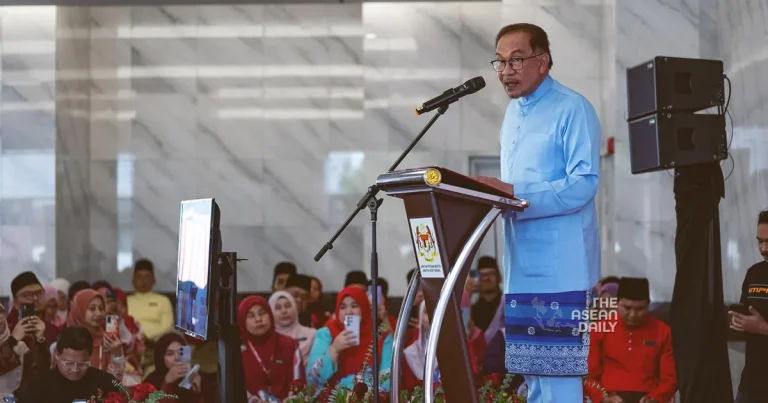1-9-2023 (KUALA LUMPUR) Following the state elections in August, the Malaysian government is gearing up to accelerate the nation’s economic reforms, with a focus on increasing workers’ wages and improving the ease of doing business, according to economists.
Prime Minister Anwar Ibrahim, who has been in office for nine months, faces the urgent task of addressing economic concerns. The combination of rising living costs and low wages for blue-collar and mid-level workers played a role in the recent voter dissatisfaction evident in state elections across six Malaysian states, where the opposition alliance Perikatan Nasional gained popularity.
Economic growth in 2023 is projected to range between 4 and 5 percent, slower than the average annual growth rate of 6 percent observed over the past two years.
Factors such as inflation, higher interest rates, and global trade tensions have contributed to economic challenges not only in Malaysia but also worldwide.
Prime Minister Anwar recently hinted at “major announcements” before presenting the Budget for 2024 in October.
On Friday, he launched the New Industrial Master Plan (NIMP), aimed at transforming the industrial sector by 2030 with an estimated investment of RM95 billion (S$27.7 billion), primarily from the private sector.
“The government is fully committed to supporting the implementation of the NIMP 2030,” Anwar said. “It will require an estimated total investment of RM95 billion over seven years, mainly from private equity, capital, and financial markets.” He added that the plan would lead to “higher value-added activities and high-skilled job opportunities.”
Anwar, who also serves as Finance Minister, emphasized that through the NIMP’s interventions, the median monthly salary in the manufacturing sector is projected to grow by 9.6 percent annually, reaching RM4,510 from RM1,976.
Investment, Trade, and Industry Minister Tengku Zafrul Abdul Aziz later disclosed that part of the NIMP’s allocations, approximately RM9.5 billion, would be unveiled in the 2024 Budget scheduled for presentation on October 13.
With a firm two-thirds majority in Parliament and control of Malaysia’s two most industrialized states, Selangor and Penang, as well as Negeri Sembilan, following the August 12 state polls, Anwar can now focus on economic issues without political constraints, according to economists.
The key is to prioritize reforms that are less likely to face political backlash, such as enhancing the social safety net for a more efficient welfare system and addressing issues related to ease of doing business, explained Amir Fareed Rahim, Director of Strategy at political consultants KRA Group.
The core expectations of Malaysians remain unchanged, with a desire for the government to control the cost of living and create more job opportunities and higher wages.
While the Anwar administration has expressed intentions to address targeted government subsidies, details are still being worked out. Subsidies in 2022 amounted to nearly RM80 billion, with fuel subsidies accounting for over half of this figure. The government also allocated approximately RM10 billion for electricity subsidies and around RM2 billion for poultry and egg subsidies.
Geoffrey Williams, an economics professor at Malaysia University of Science and Technology, highlighted that one immediate action the government can take is to boost workers’ wages and increase women’s participation in the workforce. These changes can be implemented quickly through budget policy adjustments.
Labor statistics reveal that approximately 75.7 percent of Malaysia’s 6.45 million formal employees earn less than RM5,000 monthly. Among them, a third earn less than RM2,000 per month, below the national poverty rate of RM2,589.
While Malaysia has already set a minimum monthly wage of RM1,500 starting from January 2023, the government may need to encourage employers to further increase wages, considering their concerns about rising costs and higher loan rates for business expansion.
Prof. Williams argued that despite employer complaints about the impact of the minimum wage on costs, there is little evidence to support these claims. The minimum wage has not led to higher prices or increased unemployment. He suggested that employers have room to offer a fairer share of value-added to employees, as employee compensation accounts for only 35 percent of gross operating surplus in Malaysia, compared to around 63 percent for employers.
To attract more investment, the government is streamlining approvals for businesses, especially for skilled expatriate applications. In June, the government simplified the work permit application process for companies seeking to hire professional expatriates, reducing the time frame from three to six months to about 20 days.
One approach to raising salaries involves enhancing the productivity and skills of low-income workers, such as offering training to enable workers to adapt to different tasks when necessary.
Efforts to boost the number of skilled workers are ongoing, with policies promoting key industries like electrical and electronics, chemicals, and aerospace, which create demand for STEM (science, technology, engineering, and mathematics) qualified labor, being crucial.
Data from the Department of Statistics Malaysia for the second quarter of 2023 revealed that skilled workers accounted for 25 percent of the total workforce, while semi-skilled employees constituted 62 percent, and low-skilled employees made up 13 percent.




